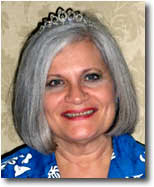Sue Bohlin addresses the call for the church to meet the needs of single moms and those widowed by death, divorce, desertion, and imprisonment.
The other morning at church, I was talking to one of our church leaders as he spotted one of our three-year-olds making a run for the lobby. He called the boy’s name three times, including extending his hand for a high-five, and was ignored all three times. (I’m a boy mom. I get it. The little guy was completely focused on escaping the worship center—no room for any other thoughts!) Laughing, I asked my friend, “Hey, how are you doing with that ‘feeling invisible’ thing?”
He was fine with it. But there are a number of people in our churches for whom feeling invisible is no laughing matter. It hurts.
A few days later, I was privileged to teach on 1 Timothy 5, where Paul gives Timothy direction on caring well for the widows in his congregation. In preparing for my message, I learned that in the first century, “widow” referred to a much larger group of women than just those whose husbands had died.
Widows could be women who had lost husbands through death, divorce, desertion, or imprisonment. (We have all four of those in our church.) They could even be women whose polygamist husbands had come to faith in Christ and learned that God’s plan for marriage is one man and one woman, and they sent all but one wife away. Widows could also refer to unmarried women; the sense of “widow” in the first century was a “without-a-man woman.” And of course in that time, when women had so few rights and privileges, that was a scary situation.
Paul’s instruction to Timothy on superintending the care of widows resonates with how important vulnerable women are to God. The Old Testament has 32 references to widows or widows and orphans! If God says something once it’s important . . . but THIRTY-TWO TIMES??!! In the New Testament, the Lord’s brother James sums up this Old Testament value, defining true religion as caring for widows and orphans in their distress (1:27).
How should the church care for vulnerable women today? The ones who can easily feel invisible in the church?
One group we need to take better care of is single moms.
I asked my dear friend, a single mom, about her experience. She was grateful for the ways in which a few people from her church stepped in to provide physically in various ways:
- A new friend brought her son to the hospital when she was suddenly admitted, and then cared for him until she was discharged.
- They mowed her lawn
- Some folks gave her a break by taking her son for a few hours to several days
- One especially memorable year, a man took her son to the store to get my friend her one and only Mother’s Day gift
But she was always plagued by a constant longing—for belonging, for protection and help, for men to provide balance to her over-protective feminine mothering.
- She longed for a healthy family to draw them into their home and invite them for meals and family times together so they could see what “healthy” and “loving” and “respectful” looked like.
- She longed for a man to invest in her son so he could see how the boy treated his mom and take him aside to say, “Hey buddy, it’s not OK to talk to your mom that way.”
- She longed for a family to say, “Come spend Christmas with us” so it wasn’t just her and her son alone with the Christmas tree—again.
In addition to relational needs, many single moms have needs for practical assistance concerning their homes and cars. And another group of “invisible women” with the same kinds of needs are older single women.
Typical practical needs:
- Help with assembling furniture such as from Ikea
- Trimming trees and other kinds of yard work
- Home repair
- Changing out-of-reach light bulbs
- Winterizing (and then summerizing) a house
- Organizing a closet, room, or garage
- Changing the oil in the car
- Moving stuff (both to a new home and just moving heavy furniture in the house)
- Plumbing help such as installing a new faucet, fixing a dripping faucet or running toilet
- Installing a ceiling fan
- Grocery shopping
- Rides to the doctor, chemo appointments, tests, surgeries and procedures
- Babysitting and carting kids places they need to go
- Helping with budgeting and financial direction
- Meals: home-cooked and delivered, gift cards to restaurants
Just as in the church at Ephesus when Paul was helping Timothy love his people well, we need to connect those with needs, with the people gifted to serve. Or even those without supernatural giftings for service, but a generous, Christlike heart to love others. That’s how the church cares for its own.
So they don’t feel invisible.
This
blog post originally appeared at blogs.bible.org/invisible-women/ on October 25, 2020.











Comments are closed.
Thank you so much. My heart hurts at what you write, and part of that pain comes from conversations I’ve had with the same women you’re talking about (older singles, regardless of the reason) who feel invisible at my church.